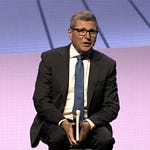Robert Bryce is a veteran energy journalist with over three decades of experience. Growing up in Tulsa, Oklahoma, an oil-industry hub, Bryce was exposed to energy issues early on. His career began in Texas, where he wrote for the Austin Chronicle for twelve years before contributing to major outlets like The Wall Street Journal and The New York Times. Bryce's mother, a teacher, instilled in him a love for clear communication, which he applies to his energy reporting by breaking down complex topics into simple terms.
Bryce emphasises the importance of making energy issues understandable to the public. He believes in presenting hard facts without spin, using concrete data and real-world examples to explain abstract concepts like power density and grid reliability. His goal is to elevate the energy debate beyond slogans, ensuring that even non-experts can form informed opinions about renewables, fossil fuels, and nuclear power.
Bryce's documentary, "Juice: How Electricity Explains the World," explores the disparity between energy-rich and energy-poor regions. Filming took him across the globe, documenting how over 3 billion people use less electricity than a typical American refrigerator. The documentary highlights the human face of energy poverty, showing how lack of electricity traps communities in hardship. Bryce's experiences reinforced his belief that affordable, plentiful energy is essential for improving living standards worldwide.
Bryce criticises international institutions like the World Bank for restricting financing for fossil-fuel power projects in developing countries. He argues that such policies keep the poor in the dark, as renewable energy alone often cannot provide the reliable electricity needed for modern economies. Bryce calls for a reorientation of international energy efforts to eradicate energy poverty by any pragmatic means.
While acknowledging the growth of wind and solar power, Bryce highlights their limitations, such as low energy density and land use issues. He points out that large-scale deployments can lead to conflicts over land and environmental impacts. Bryce also questions the return on investment for renewables, citing Germany's high electricity prices despite significant spending on wind and solar. He advocates for a balanced approach, using renewables where practical but also investing in high-density, always-on sources like nuclear and natural gas.
Bryce expresses concern that aggressive decarbonisation policies often hurt working-class and low-income people the most. He argues that programs to "electrify everything" can raise the cost of living for ordinary citizens. Bryce calls for energy realism, balancing emissions reduction with keeping energy affordable to avoid exacerbating social inequalities.
Bryce draws lessons from international examples, such as Germany's high electricity prices and reliance on coal after shutting down nuclear plants, the UK's vulnerability to wind droughts, and Australia's high electricity costs due to overinvestment in renewables. He contrasts these with China's focus on growth and reliability, building a mix of coal, gas, hydro, renewables, and nuclear to ensure ample energy for development.
Bryce is a strong proponent of nuclear energy, arguing that it is essential for reducing emissions and lifting billions out of energy poverty. He believes that advanced nuclear designs and streamlined regulations can overcome past opposition and make nuclear a central part of the energy mix.
Bryce critiques the climate change movement for sometimes taking on religious or quasi-religious undertones, treating fossil fuel use as sinful and ignoring trade-offs and human costs. He advocates for energy humanism, focusing on practical steps to improve lives rather than treating lower carbon emissions as the sole end goal.
Bryce highlights how energy poverty disproportionately affects women and girls, trapping them in subsistence roles. Access to electricity can transform their lives, enabling education, employment, and better health. Bryce calls for prioritising energy access to uplift women and girls in developing countries10.
For those interested in learning more, Bryce's work can be found in his books, Substack newsletter, Power Hungry podcast, and the documentary "Juice." He remains active on social media, sharing insights and engaging with the public on energy issues.











